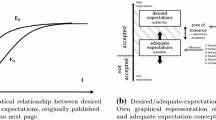Abstract
The current paradigm change towards Quality of Experience (QoE) does not only have conceptual and methodological consequences, but at the same time exhibits a profound impact on corresponding economic and business models, especially in the telecommunications market. This chapter deals with related issues from several layers of abstraction. We consider the general ecosystem level, proceed to resulting Customer Experience Management (CEM) systems, discuss consequences for Service Level Agreements (SLA), and finally analyze the implications if it comes to charging for QoE. As a result, it should become clear that integrating the economic dimension into QoE research provides an indispensable step towards enabling the future commercial success of the telco industry as such.
Access this chapter
Tax calculation will be finalised at checkout
Purchases are for personal use only
Similar content being viewed by others
Notes
- 1.
- 2.
Here, especially the manifold dimensions of the user context are worth being mentioned, including temporal factors and user characteristics, as pointed out already in [10]. Note, however, that for the purpose of clarity of the model, we restrict our present discussion to the role of pricing only.
References
Perkis A (2013) Quality of experience. SPIE Newsroom, 27 Feb 2013. http://spie.org/x92222.xml, doi:10.1117/2.1201302.004591
Le Callet P, Möller S, Perkis A (eds) (2012) Qualinet white paper on definitions of quality of experience–output version of the Dagstuhl seminar 12181. European network on quality of experience in multimedia systems and services (COST Action IC 1003). Lausanne, Version 1.1, June 2012
Perkis A (2013) QoE cross layer approach to model media experiences. IEEE COMSOC MMTC E-Letter 8(2):6–9. http://committees.comsoc.org/mmc/e-news/E-Letter-March13.pdf
Kilkki K (2008) Quality of experience in communication ecosystems. J Univ Comput Sci 14(5):615–624
De Moor K (2012) Are engineers from Mars and users from Venus? Bridging gaps in quality of experience research: reflections on and experiences from an interdisciplinary journey. Ghent University, Faculty of Political and Social Sciences, Ghent, Belgium
Ickin S, Wac K, Fiedler M, Janowski L, Hong J, Dey AK (2012) Factors influencing quality of experience of commonly used mobile applications. IEEE Commun Mag 50:48–56
Guerzoni R, Fontana C, Beker S, Soldani D (2013) A user centric troubleshooting framework for current and future networks. Wireless World Research Forum Meeting 30, Oulu, Apr 2013
Courcoubetis C, Weber R (2003) Pricing communication networks: economics, technology and modelling. Wiley, New Jersey
Jain R (2006) Internet 3.0: ten problems with current internet architecture and solutions for the next generation. In: Proceedings of IEEE/AFCEA MILCOM 2006, Washington, Oct 2006
Reichl P, Hammer F (2006) Charging for quality-of-experience: a new paradigm for pricing IP-based services. 2nd ISCA tutorial and research workshop on perceptual quality of systems, Berlin, Germany, pp 171–177
Reichl R (2010) From charging for quality-of-service to charging for quality-of-experience. Ann Telecommun (special issue on Quality of experience and socio-economic issues of network-based services) 65(3):189–199
Reichl P, Maillé P, Zwickl P, Sackl A (2013) A fixed-point model for QoE-based charging. In: Proceedings of ACM SIGCOMM 2013 workshop on future human-centric multimedia networking, Hong Kong, China, Aug 2013
Sackl A, Zwickl A, Reichl P (2013) QoE Alchemy 2.0: an improved test setup for the pecuniary bias of QoE. In: Proceedings of 5th International Workshop on Quality of Multimedia Experience (QoMEX’13), Klagenfurt, Austria, July 2013
Author information
Authors and Affiliations
Corresponding author
Editor information
Editors and Affiliations
Rights and permissions
Copyright information
© 2014 Springer International Publishing Switzerland
About this chapter
Cite this chapter
Perkis, A., Reichl, P., Beker, S. (2014). Business Perspectives on Quality of Experience. In: Möller, S., Raake, A. (eds) Quality of Experience. T-Labs Series in Telecommunication Services. Springer, Cham. https://doi.org/10.1007/978-3-319-02681-7_7
Download citation
DOI: https://doi.org/10.1007/978-3-319-02681-7_7
Published:
Publisher Name: Springer, Cham
Print ISBN: 978-3-319-02680-0
Online ISBN: 978-3-319-02681-7
eBook Packages: EngineeringEngineering (R0)




